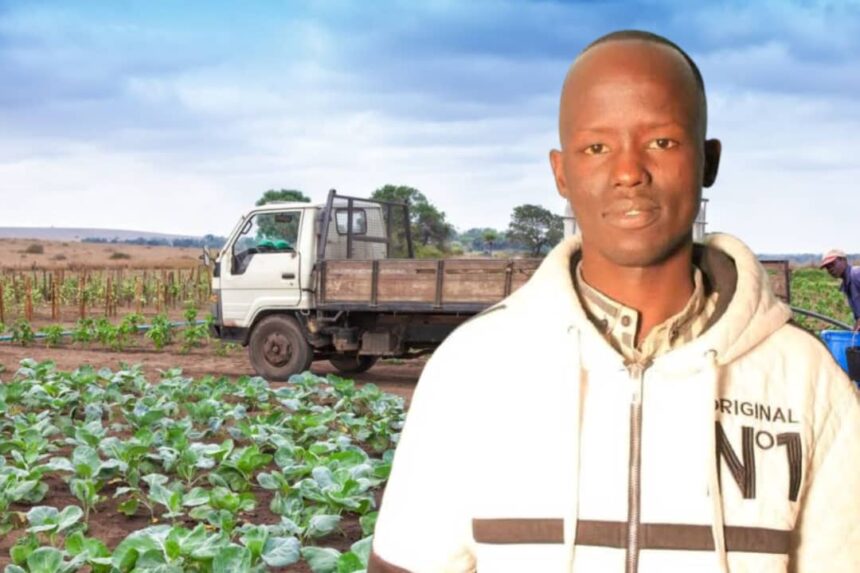Across Africa, millions of smallholder farmers remain at the mercy of unreliable markets and broken logistics systems. They produce the food that sustains the continent, yet many can’t sell at fair prices or reach buyers beyond their local regions.
Post-harvest losses, unpredictable pricing, and opaque middlemen networks continue to plague a sector that employs over 60% of the population.
While cities digitize rapidly, Africa’s rural food economy remains stuck in an analog loop, where abundance often meets scarcity, and effort rarely guarantees income.
It’s against this backdrop that a young African startup is stepping forward with a digital-first approach to one of the continent’s oldest problems.
In this edition of Techparley’s Drive100, where we spotlight Africa’s most promising ventures, we turn our attention to MavunoLink, a forthcoming agri-tech platform founded by Deng Ajing Chol, aiming to redefine how farmers, buyers, and transport providers connect across Africa’s fragmented agricultural supply chains.
Though not yet launched, MavunoLink has already started to draw attention for its ambition: to become the continent’s most trusted agricultural marketplace, one built on transparency, traceability, and fair access for every player in the food value chain.
The Birth of MavunoLink
For founder Deng Ajing Chol, MavunoLink wasn’t born from theory but necessity. Growing up in a farming community, he witnessed how much value smallholder farmers lost simply because they were invisible to the broader market system.
Despite producing quality crops, many couldn’t find reliable buyers or affordable logistics options.
“The problem wasn’t that we lacked produce, it was that we lacked connection,” Chol recalls.
That gap became the foundation for MavunoLink. The platform was conceived as a digital marketplace where verified farmers can showcase their produce, buyers can place secure orders, and logistics partners can handle deliveries transparently.
But beyond a trading hub, Chol envisioned an ecosystem, one where technology restores fairness and trust, allowing rural farmers to benefit from the same digital inclusion driving Africa’s fintech and e-commerce boom.
How It Works
MavunoLink plans to function as a multi-actor platform, connecting everyone involved in the agricultural value chain, from producers, distributors, logistics providers, to end-buyers.
Farmers will onboard their produce with clear details, type, quantity, grade, and location. Buyers, including retailers, exporters, and institutional purchasers, can browse listings, compare prices, and initiate transactions directly.
Once an order is confirmed, the platform automatically integrates logistics partners based on proximity and capacity.
Payments are secured through integrated digital wallets and blockchain-backed verification, ensuring that funds are released only after confirmed delivery.
Each transaction generates a traceable record, preventing disputes and fraud while helping farmers build a verified digital reputation, a vital step toward accessing future credit or investment.
In addition, MavunoLink aims to embed AI-driven analytics to forecast demand trends, optimize delivery routes, and help farmers decide what crops to plant based on market insights, transforming agriculture from guesswork into informed decision-making.
What Sets It Apart
Unlike most agri-marketplaces focused solely on connecting farmers to buyers, MavunoLink’s innovation lies in its end-to-end integration of logistics, finance, and data transparency. The platform doesn’t just connect, it coordinates.
Its blockchain-powered transaction ledger ensures every deal is recorded, traceable, and tamper-proof, fostering trust among users who might have previously been skeptical of online systems.
The inclusion of small-scale logistics providers also democratizes participation, enabling rural transporters, truck owners, and motorbike operators to find work through verified supply chains.
Moreover, MavunoLink seeks to localize its technology. Instead of importing Western systems ill-suited to Africa’s realities, it’s being built to handle low-data environments, mobile-first users, and regional payment barriers.
As Chol explains, “We’re not just building a platform for Africa, we’re building it from Africa’s realities outward.”
Meet the Team Behind MavunoLink
MavunoLink’s founding team reflects a blend of technical expertise and grassroots insight. Deng Ajing Chol, the visionary founder and CEO, brings years of firsthand agricultural experience and leadership in community-based enterprise projects.
He is joined by software developers, agricultural economists, and supply chain strategists from across East and Central Africa.
Each member contributes specialized knowledge, from designing mobile-friendly user interfaces that can function offline, to developing algorithms that verify farm produce quality through image analysis.
This cross-disciplinary approach has allowed the team to think holistically about the agricultural economy, not just its digital infrastructure.
Their mission is unified and clear, simply to give every farmer, regardless of scale or geography, a fair chance to reach markets and buyers directly.
“We want to build a system where transparency replaces speculation, and farmers finally earn what their work is truly worth,” Chol says.
Challenges and Lessons
Building a platform like MavunoLink in Africa isn’t without hurdles. Connectivity remains patchy in rural areas, and digital literacy gaps could limit early adoption.
The team must also navigate varying agricultural policies across borders, as MavunoLink plans to serve multiple regions from the start.
Yet, Chol and his team have taken a proactive stance. They’re forming early partnerships with agricultural cooperatives, NGOs, and rural extension officers who can act as digital intermediaries, onboarding farmers and helping them understand the value of online trade.
They’re also exploring localized language options within the app and SMS-based notifications for areas with limited internet.
Perhaps the biggest challenge will be trust, and that’s precisely what MavunoLink is betting its future on, that technology, when built transparently, can rebuild confidence in markets that have long been exploited.
The Road Ahead
MavunoLink is currently in its pre-launch phase, with pilot testing expected to roll out in early 2026. The pilot will focus on select regions in East Africa, targeting smallholder cooperatives that grow maize, groundnuts, and vegetables.
The goal is to onboard 5,000 farmers and 300 logistics partners in the first year, scaling to 50,000 users by 2028.
The startup is also seeking early partnerships with fintechs to facilitate instant payments and insurtech startups to help farmers secure their produce in transit, ensuring that every layer of the agricultural process is digitally protected.
If executed successfully, MavunoLink could emerge as one of Africa’s most consequential agri-tech stories, not just solving trade inefficiencies, but setting a new precedent for transparency and fairness in the continent’s agricultural economy.
MavunoLink isn’t simply a digital idea waiting to happen, it’s a symbol of how Africa’s next big innovation wave might grow not from the cities, but from the soil.
______________________
Bookmark Techparley.com for the most insightful technology news from the African continent.
Follow us on X/Twitter @Techparleynews, on Facebook at Techparley Africa, on LinkedIn at Techparley Africa, or on Instagram at Techparleynews






